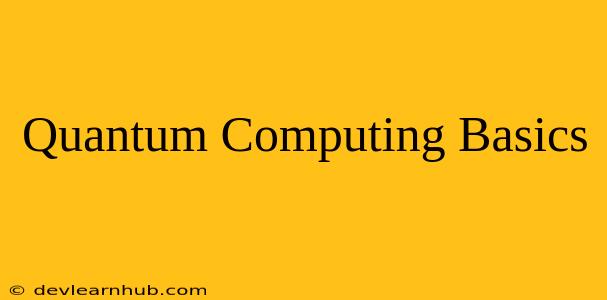Introduction
Quantum computing is a new type of computing that harnesses the principles of quantum mechanics to perform operations on data. Unlike classical computers that use bits to represent information as either 0 or 1, quantum computers use qubits which can represent 0, 1, or a superposition of both. This unique property allows quantum computers to perform computations that are impossible for classical computers, making them potentially revolutionary in various fields such as medicine, materials science, and artificial intelligence.
Key Concepts
- Qubits: The basic unit of information in quantum computing. Unlike classical bits that can only be 0 or 1, qubits can be in a superposition of both states simultaneously. This is possible due to the principle of quantum superposition, which allows a quantum system to exist in multiple states at the same time.
- Entanglement: A phenomenon where two or more qubits become linked, regardless of their physical distance. When entangled, the state of one qubit instantly influences the state of the other, even if they are separated by vast distances. This spooky action at a distance allows for powerful computational capabilities.
- Quantum Gates: Similar to logic gates in classical computing, quantum gates are operations performed on qubits. However, quantum gates utilize quantum properties like superposition and entanglement to manipulate the qubits' states.
Benefits of Quantum Computing
- Speedup for certain problems: Quantum computers can solve certain problems exponentially faster than classical computers. For example, factoring large numbers, which is a challenging problem for classical computers, can be solved efficiently using Shor's algorithm on a quantum computer.
- New possibilities for scientific discovery: Quantum computers can simulate complex quantum systems, such as molecules and materials, which is impossible with classical computers. This enables researchers to accelerate drug discovery, design new materials, and understand fundamental physics.
- Advancements in artificial intelligence: Quantum computers can potentially enhance machine learning and artificial intelligence algorithms, leading to more powerful and efficient models.
Challenges of Quantum Computing
- Building stable qubits: Maintaining the delicate quantum states of qubits is challenging due to noise and decoherence. This requires specialized environments and advanced error correction techniques.
- Scalability: Building large-scale quantum computers is a complex engineering challenge. The number of qubits needed to solve practical problems is still quite high, and scaling up quantum systems without losing coherence is a major hurdle.
- Developing quantum algorithms: Designing efficient and practical quantum algorithms is crucial for leveraging the power of quantum computers. Research in this area is ongoing, and new algorithms are being developed continuously.
Conclusion
Quantum computing is a rapidly evolving field with the potential to revolutionize various industries. While challenges remain, ongoing research and development are paving the way for practical applications. As the technology matures, we can expect quantum computers to play an increasingly significant role in shaping the future of computing and scientific discovery.
